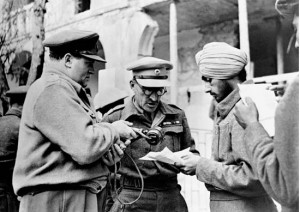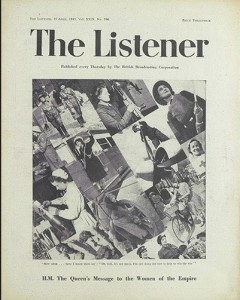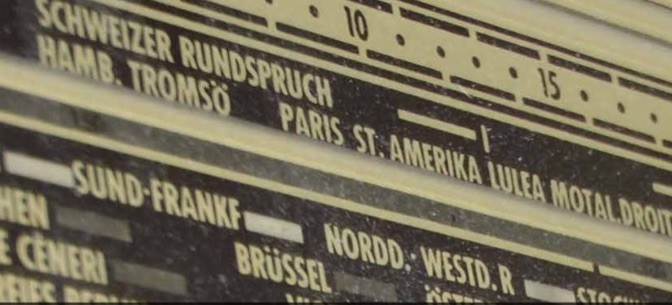by Sejal Sutaria, Marie Skłodowska Curie Fellow, English Department, King’s College London, and Pragya Dhital, PhD (2016), Religions and Philosophies Department, SOAS
My journey into radio research began when a series of happy accidents led me to discover the ‘British in India Oral Archive’ at the British Library, SOAS, and Imperial War Museums. The interviews here were conducted by history writer Charles Allen, best known for his books on Indian colonial history, Rudyard Kipling, and Tibet. As someone working on a project about how the global circulation of migrants, capital and ideas shaped Indian resistance to colonialism and fascism, my access to these first-hand accounts of life in India during the forties led me to link ideas of literary life-writing with oral history. When the World Service Project at King’s invited proposals from researchers working on radio, Elaine Morley and I decided to organise the ‘BBC and the World Service: Debts and Legacies’ conference.
The plenary sessions prompted lively debate about how best to interpret the content, form, or socio-cultural impact of radio programmes that defined the institutional role of the BBC. For instance, Todd Avery, University of Massachusetts Lowell, and Debra Rae Cohen, University of South Carolina, both known for their ground-breaking work connecting modernist practice with broadcasts on the BBC’s Home Service, spoke to questions of genre, experimentation, and methods for engaging aspects of aesthetic practice.
Listen to a clip from Todd Avery and Debra Rae Cohen’s plenary
In turn, Jessica Berman, University of Maryland, Baltimore County, Daniel Ryan Morse, University of Nevada Reno, and Simon Potter, University of Bristol, drew from their expertise on transnational networks to link these debates to the evolution of the World Service.
Many papers illuminated how the Home and Overseas Services became platforms for nationalist propaganda as much as for anti-imperial, anti-fascist critique from the thirties to the seventies.
Some researchers employed literary methods to demonstrate how the BBC translated content into instruction or entertainment that moved between propaganda and soft diplomacy to promote social or political agendas. On programmes like ‘Voice’ or ‘Points of View,’ British, Indian, African, and Caribbean writers and artists came together for conversations that modelled friendly cross-cultural exchange and projected harmonic relations between metropole and colony.
 From metropole to colony: BBC war correspondent Richard Dimbleby (left) assisting Indian troops to record messages to be sent home, June 1942. Photograph © britannica.com.
From metropole to colony: BBC war correspondent Richard Dimbleby (left) assisting Indian troops to record messages to be sent home, June 1942. Photograph © britannica.com.
Other researchers explored how producers learning to master new technologies found that trial-and-error led to new programme formats such as rhetorical experimentation, radio interviews, or pageants that transformed listener exposure to distant realities. Radio essays like Dylan Thomas’s ‘Return Journey’ vivified the climate of post-blitz Swansea, even as many worried about the impact of sound on the human body.
Academic reflections upon the role BBC Radio played in the decades after it was founded in 1922 offer poignant insights into the cultural and political potency that podcasts or other sonic platforms have today. The resurgence of excitement about sound seems striking, given the dominance of visual, text-based social media.
Just as radio fostered intimacy between listeners and their private encounter with the materiality of people’s voices, podcasts facilitate the same intimacy with the added ability for listeners to curate programme content, and the time and sequence in which it is consumed.
At a moment when many people see the rise of the global Right as one that echoes the rise of Nazi and fascist forces in the thirties and forties, the papers presented, coupled with the dialogue they inspired, are salient and timely. For instance, programmes like ‘The Stones Cry Out’, which fostered empathy about the Blitz across Britain’s colonies or broadcasts on the BBC German Service aimed to encourage resistance against the Nazis, subversively invoked propaganda devices to persuade, unite and mobilise. Learning about the ambivalence internalised in programmes by contributors with divided loyalties like E.M. Forster or Mulk Raj Anand—who supported Britain’s fight against fascism on one hand and challenged its capitalist colonialism on the other—left me thinking that there is a dangerously fine line between empathy and propaganda.
A dangerously fine line between empathy and propaganda…?
While the potency of media-based fear mongering is undeniable, the radio conference also reminded us that programming on the BBC, clandestine resistance broadcasts, or activist-driven community radio were equally potent in promoting cultural understanding, civil liberties, and speaking truth to power. Looking at radio’s influence upon popular imagination or political consciousness in the past speaks to sonic circulation’s potential today to bridge divides before they grow dangerously wider.
– Sejal Sutaria

Photograph © Garware Plastics Pvt Ltd
Like many of those who attended the ‘BBC and the World Service: Debts & Legacies’ conference, I came to radio studies by accident. While researching the Indian Emergency of 1975-77, I was struck by how censorship of print media during this period had co-existed with unrestricted international radio broadcasts. The PhD chapter I wrote on this material used reader response theory to counter sender-message-receiver models of communication, which seemed unable to encompass the quirks of media reception at this time.
By looking at how news of the assassination of the President of Bangladesh, Sheikh Mujibur Rahman (1920-1975), was disseminated via foreign radio broadcasts and written about in the prison diaries of politicians arrested in connection with the Emergency in India, I worked towards a different understanding of the movement of power and information within and across national boundaries.
I was therefore very pleased to get a chance to participate in a conference on radio organised by the English Department at King’s. Radio studies as done by literary scholars, it emerged during its course, is both necessarily interdisciplinary and focused on texts. Papers discussed the BBC’s role as a literary patron and the texts produced by writers it had employed. Audience response was gauged through letters and articles published in the BBC’s magazine, The Listener.
 Photograph © The Listener Historical Archive, 1929-1991
Photograph © The Listener Historical Archive, 1929-1991
This textual emphasis was justified by the fact that BBC broadcasters had to present scripts ahead of time, and many of its broadcasts were deleted. General difficulties in understanding audiences also seem to be exacerbated with a mass medium such as radio, which, as Anna Snaith observed, was dismissed as background ‘noise’ by its early critics. How to capture the response of absent-minded listeners?
In addition to looking at the conditions of listening, several papers described a concern with the inculcation of speech patterns appropriate to the categories of class, region and nation. For many of the ‘new states’ who received BBC World Service broadcasts, this brought up the vexed question of national language, making what was formerly known as the Empire Service a useful focus for the study of imperialism and its legacy.
Discussion ranged over the role of the BBC in different contexts and periods: from the colonial era, to post-independence and the Cold War periods, when the vaunted neutrality of the World Service allowed Britain to continue to assert her status as an arbiter of news and culture – the civilising mission recast as global public service.
Panellists described how these efforts were undercut by the tension between authentic and correct speech played out in BBC broadcasts, both within Britain and overseas. They also looked at how writer-broadcasters resisted and repurposed its mission. Examples of this double manoeuvre included Julie Cyzewski from Murray State University discussing Attia Hosain’s refusal to perpetuate neo-colonial relations under the guise of friendship, and continued attachment to the BBC Hindustani service as a way of recovering a lost world, encompassing Hindi-Urdu and an undivided India. Emily Bloom from Columbia University examined Louis MacNeice’s view of radio as an echoing chamber of lies and received opinion, and attempted to recover its possibilities in the ‘anti-propaganda propaganda’ of his wartime broadcasts.
Other papers described how both credulity and scepticism featured in the relationship between anonymous listener and disembodied voice.
These examples underlined the value of literary methodologies for studying radio, which allow for richer and fuller accounts of media practices than behaviourist understandings of audiences and documentary approaches to the study of texts. Across the conference, these papers were complemented by histories of the BBC, and insights from sound studies and musicology. The conference therefore also stands out for me as an example of successful interdisciplinary dialogue, as literary studies, combined with other disciplines, offered new insights for the study of an institution and an aural medium.
– Pragya Dhital
The ‘BBC and the World Service: Debts and Legacies Conference‘ was made possible through the generous support of the Arts and Humanities Research Institute, Marie Sklodowska Curie Individual Fellowship, Department of English, and the Arts and Humanities Faculty Research Committee.
Conference Organisers: Sejal Sutaria and Elaine Morley
You may also like to read:
‘Loving, Living and Resisting: A Postcolonial Conversation‘

